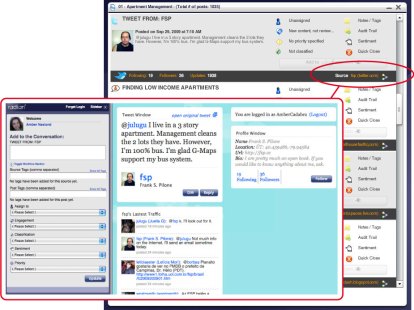
 An early venture-backed player in the social media marketing space is seeing its foresight pay off.
An early venture-backed player in the social media marketing space is seeing its foresight pay off.
Radian6, a company that helps brands manage online conversations across the blogosphere, Twitter and Facebook, capped off its first profitable year and is looking to increase its research and development spending by 50 percent this year.
Based far, far away from Silicon Valley in New Brunswick, Canada, the company built a roster of 1,300 clients including MTV, Dell and Walmart as these companies have started spending on serious experimentation with social media marketing. In the last quarter, the company’s customer list grew by a third.
AI Weekly
The must-read newsletter for AI and Big Data industry written by Khari Johnson, Kyle Wiggers, and Seth Colaner.
Included with VentureBeat Insider and VentureBeat VIP memberships.
“By the end of 2010, there won’t be many brands that don’t have some kind of solution,” said chief executive Marcel LeBrun. “The new paradigm is about building communities and relationship capital around a brand.” Indeed, the largest companies like Facebook and Twitter perceive themselves as a gateway for advertisers to influence consumers earlier in the buying cycle. Facebook is ramping up hiring and spending to boost its brand and self-serve ad offerings while Twitter is anticipated to launch its own advertising network next month.
Initially, Radian6 focused on monitoring conversations in the blogosphere, well before it was clear that Twitter and Facebook would be the dominant spaces for social sharing and communication. The company, which now has 90 employees, raised $4 million in 2006 and then another $5.5 million two years later from investors including BCE Capital, Brightspark Ventures and BDC Venture Capital.
“While we didn’t necessarily know which platform was going to take off, we knew that the way people were getting information and acting on it was shifting from institutions to personal social networks,” he said. “What we didn’t anticipate was how deep in the enterprise these changes would affect every professional.”
The company built a set of tools to help companies track and analyze mentions of their brand names over time. It would let them identify influential voices or manage workflow so that employees could reach out to specific customers.
Competitors like Scout Labs and HootSuite have also quickly cropped up in the space with social media dashboards that are targeted at more professional users who need to respond quickly to potential customer needs online. Another competitor CoTweet, which helps businesses manage their presence on Twitter, was recently acquired by ExactTarget, paving the way for an integrated e-mail and social media marketing system.
Radian6 responded with its own offering a week ago, an engagement console that covers all types of media, including blogs, discussion boards, Twitter, Flickr, Google Buzz, LinkedIn Answers and Facebook fan pages.
LeBrun says his company runs on the theory that social media is affecting companies in seven primary ways:
- Brand monitoring: Companies need to keep track of what’s being said about them and guide the conversation.
- Web analytics: Because a brand’s online presence is distributed across social networks and is no longer confined to a single web site, companies need analytics that run across all platforms.
- Social customer relationship management: This one is fairly obvious, as brands like Best Buy and Virgin Airlines have come to see Twitter as a way to immediately jump in on problems tweeted by dissatisfied customers.
- Enterprise social software: Yammer and Salesforce’ Chatter try to fill this void by creating private versions of social networking spaces for companies.
- Enterprise content management: Companies need ways to keep track of their internal knowledge.
- Enterprise marketing and automation platforms: Software that helps companies manage their marketing campaigns across multiple channels like e-mail, mobile phones and social networks.
- Online advertising: Increasingly, the bits and atoms of data shared on the social web will become crumbs for personalized ad targeting. Facebook already does this by directing ads to people based on their age, gender, location, professed interests and more, but it will become more sophisticated over time and more companies will have a role in this.
“People may look at social media as an alternative to advertising, but it’s really more like a phone,” LeBrun explained. “Every phone is a multipurpose communication platform.”
VentureBeat's mission is to be a digital town square for technical decision-makers to gain knowledge about transformative enterprise technology and transact. Learn More